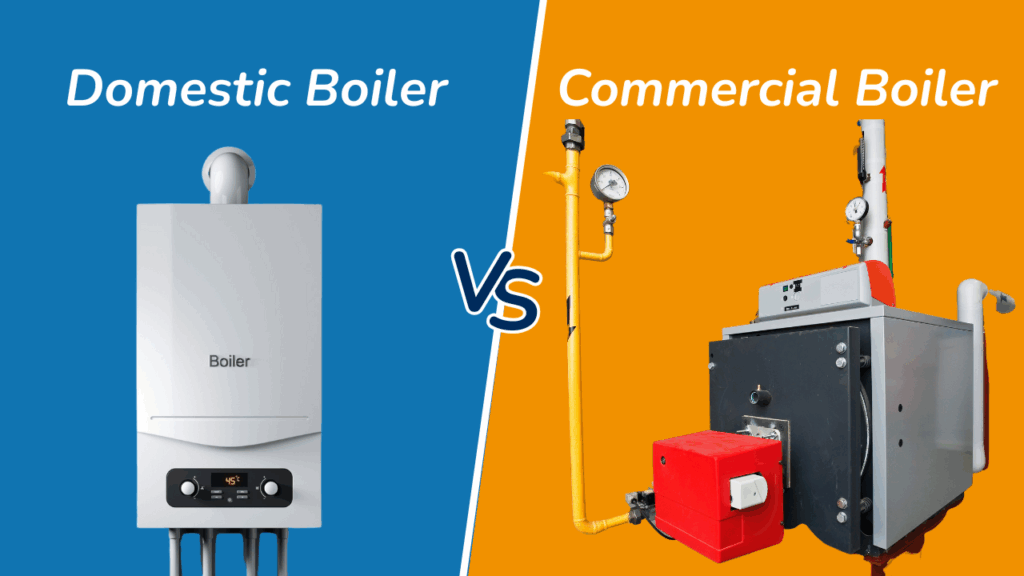Contents
Your commercial heating system can be either a compliance risk that threatens your business with penalties and disruption, or a well-maintained asset that operates efficiently year-round. Whether you manage an office block in Edinburgh, operate a care home in the Highlands, or lease commercial properties across Glasgow’s business districts, understanding your commercial boiler service requirements protects both your bottom line and legal standing. This comprehensive guide covers everything Scottish businesses need to know about commercial boiler service and maintenance, compliance requirements, and the significant cost savings available through professional servicing.
Legal Requirements for Commercial Boiler Service in Scotland
Scottish businesses cannot treat boiler maintenance as optional. The law demands regular servicing, with severe consequences for non-compliance that extend beyond financial penalties to potential criminal prosecution.
Gas Safety (Installation and Use) Regulations 1998
Every commercial property with gas appliances must undergo annual safety checks by a Gas Safe registered engineer. This legal requirement applies to all business premises, from small offices to large industrial facilities. The Health and Safety Executive (HSE) actively enforces these regulations, with penalties reaching £20,000 per offence and potential imprisonment for serious breaches. For detailed guidance on commercial gas safety requirements, see the HSE’s official guidance on gas safety in commercial premises.
Your commercial boiler service must include:
- Comprehensive inspection of all gas appliances and flues
- Verification of operating pressures and heat inputs
- Testing of all safety devices and controls
- Ventilation adequacy assessment
- Combustion performance analysis
- Issue of valid Gas Safety Certificate documentation
The engineer must hold Gas Safe commercial registration – domestic qualification alone isn’t sufficient for commercial properties. Working with SafeContractor approved companies provides additional assurance, as this accreditation demonstrates rigorous health and safety compliance beyond basic requirements. Following the inspection, you’ll receive a Gas Safety Certificate (CP42) that must be retained for at least two years. This document proves compliance during HSE inspections, insurance claims, or property transactions.
💡 Quick Tip: Schedule your commercial boiler service for August to avoid the September rush. Most Scottish businesses wait until heating season starts, leaving them vulnerable to October breakdowns when engineers are fully booked.
Pressure Systems Safety Regulations 2000
Commercial boilers operating above 0.5 bar pressure typically require a Written Scheme of Examination from a competent person. This document determines inspection frequency based on your specific system’s risk assessment. Most commercial systems need examination every 14 months, though high-risk installations may require more frequent inspection.
Failure to maintain a valid Written Scheme can result in HSE improvement notices, prohibition notices stopping your business operations, or prosecution. Your insurance company may also refuse claims related to pressure system failures without proper documentation.

Domestic vs Commercial Boiler Servicing: Key Differences
Many businesses mistakenly assume their regular plumber can service commercial boilers. This misconception risks both safety and compliance. Commercial systems demand specialised expertise that goes far beyond domestic boiler knowledge.
⚠️ Warning: Using a domestic-only Gas Safe engineer for commercial work is illegal and invalidates your insurance. Always verify commercial registration (CCN1) before booking.
Technical Complexity
Commercial boilers operate at higher pressures and outputs than domestic units. A typical commercial system might run at 2-3 bar pressure with outputs exceeding 70kW, compared to domestic boilers at 1-1.5 bar and 24-40kW. These higher specifications require different safety protocols and testing procedures.
Multiple boiler configurations add complexity. Commercial properties often use cascade systems where several boilers work together, requiring synchronisation checks and lead boiler rotation to ensure even wear. The engineer must understand how these boilers communicate and share loads.
Qualification Requirements
Gas Safe registration includes different categories. Commercial engineers need specific CCN1 (commercial core safety) plus additional qualifications like CIGA1 (commercial meters), CORT1 (commercial boilers), or ICPN1 (commercial pipework). Domestic Gas Safe registration doesn’t cover commercial work.
Companies holding SSIP (Safety Schemes in Procurement) accreditation have demonstrated their commitment to maintaining these qualification standards across their engineering teams, providing confidence that all engineers working on your site hold appropriate certifications.
Building Management Systems
Commercial boilers typically integrate with Building Management Systems (BMS) that control heating zones, monitor efficiency, and adjust operation based on occupancy. Your service engineer must understand these control systems, verify communication protocols, and ensure optimal programming for energy efficiency.
Safety System Complexity
Commercial installations include additional safety features like gas proving systems, interlock controls, and automatic isolation valves. These require specific testing procedures beyond domestic servicing scope. The engineer must document each safety system’s operation and confirm compliance with current standards.

Landlord Boiler Service Requirements
Commercial landlords carry enhanced responsibilities that go beyond standard business compliance.
Every property you rent out must meet strict gas safety regulations, and as the landlord, you’re personally liable for ensuring that happens.
Read our guide on A Practical Guide to Landlord Gas Safety in Scotland
Mandatory Annual Inspections
Landlord boiler service obligations are non-negotiable.
A valid Gas Safety Certificate (CP12) must be renewed before the previous certificate expires — not within twelve months, but by the expiry date itself. Missing that deadline, even briefly, can be treated as a breach of regulation.
Each annual inspection includes checks on:
- Gas appliances supplied by the landlord
- Flues and chimney systems
- Pipework and emergency control valves
- Ventilation and combustion safety
Only a Gas Safe registered engineer can carry out these checks and issue a certificate.
Tenant Communication Requirements
After the inspection, landlords must provide tenants with a copy of the Gas Safety Certificate within 28 days.
New tenants should receive a valid certificate before occupancy begins, and for commercial lets, the document should be included in the lease pack.
Electronic copies are acceptable if tenants consent — but keep proof of delivery for your records.
Record-Keeping Obligations
Gas safety records must be retained for at least two years, though keeping them for up to five years offers better protection in case of insurance queries or disputes.
Each record should show:
- Engineer’s Gas Safe registration number
- Checks performed and any defects found
- Remedial actions taken
- Next inspection due date
Insurance Implications
Most property insurance policies require proof of valid Gas Safety Certificates.
Allowing certification to lapse can void cover for:
- Tenant business interruption claims
- Property damage from gas incidents
- Personal injury or legal defence costs
Working with IWA-backed contractors adds an extra layer of protection, as their insurance-backed warranties guarantee completed work even if the contractor ceases trading.ional protection through insurance-backed warranties, ensuring work is guaranteed even if the contractor ceases trading.
What’s Included in Professional Commercial Boiler Service
Professional commercial boiler service goes far beyond basic safety checks. Understanding what comprehensive servicing includes helps you evaluate whether your current provider delivers adequate value and compliance.
The 26-Point Commercial Service
A thorough commercial service examines every component affecting safety, efficiency, and reliability:
Visual Inspections:
- Boiler casing and seals condition
- Flue terminals and routes
- Pipework and valve integrity
- Ventilation grille clearance
- Condensate drainage systems
- Signs of water leaks or corrosion
Operational Checks:
- Burner operation and flame pattern
- Ignition sequence timing
- Safety device activation
- Control system response
- Pump and fan operation
- Expansion vessel pressure
Performance Testing:
- Gas rate measurement against data plate
- Working pressure verification
- Flow and return temperatures
- Combustion efficiency analysis using calibrated flue gas analysers
- CO/CO2 ratio checks
- Heat exchanger effectiveness
Scottish Operating Conditions
Scottish commercial systems run significantly more hours annually than southern UK equivalents due to our climate. This extended operation requires particular attention to:
- Burner components showing accelerated wear
- Heat exchanger cleaning for maintained efficiency
- Pump bearings and seals
- Fan motors and bearings
- Control valve operation
Post-Service Documentation
Following service completion, you should receive:
- Detailed service report listing all checks performed
- Combustion analysis printout showing efficiency readings
- Identified defects with remedial recommendations
- Gas Safety Certificate (if included in service)
- Next service due date
- Engineer’s Gas Safe registration details
Professional providers increasingly offer digital reporting with photographic evidence, historical trend analysis, and automated compliance reminders.
The True Cost of Reactive vs Preventive Maintenance
Scottish businesses often view commercial boiler servicing as an expense to minimise. However, industry studies consistently show planned maintenance delivers significantly lower lifetime costs compared to reactive-only approaches.
Find out more about the True Cost of Commercial Boiler Repair and how it can affect your business beyond financial impact
Hidden Costs of Reactive Maintenance
Waiting for breakdowns creates cascading expenses that dwarf prevention costs:
Emergency Callout Premiums Weekend and evening callouts typically cost 150-200% more than scheduled service. A standard £350 service becomes £700-1,050 as an emergency, before any parts or repairs.
Business Disruption Losses Scottish winter heating failures can make premises legally uninhabitable under Workplace (Health, Safety and Welfare) Regulations 1992, which mandate minimum 16°C temperatures. With average Scottish winter temperatures 2-3°C lower than England, recovery takes longer. A three-day heating failure in January could cost businesses tens of thousands in lost productivity.
Accelerated Equipment Deterioration Neglected boilers accumulate scale, soot, and corrosion. The Energy Saving Trust notes that regular maintenance is essential for efficiency, with unmaintained boilers consuming significantly more fuel. On a £20,000 annual gas bill, even a 10% efficiency loss means £2,000 wasted yearly.
Warranty Invalidation Manufacturers require annual servicing by qualified engineers to maintain warranties. Skipping service voids coverage, leaving you liable for expensive repairs. Commercial heat exchanger replacement costs £3,000-8,000 – covered under warranty if properly maintained, your expense if not.
Secondary Damage Catastrophic failures can cause consequential losses. Burst heat exchangers can flood properties, while failed pumps may cause system freezing and extensive pipework damage.
Preventive Maintenance Returns
💰 Cost Saving Tip: Track your boiler’s runtime hours monthly. Systems running over 2,000 hours annually benefit from bi-annual servicing – the extra service cost is offset by reduced emergency callouts and improved efficiency.
Find our complete guide on How to Prevent Costly Commercial Boiler Breakdowns: A Scottish Business Guide
Scheduled servicing delivers quantifiable benefits:
Extended Equipment Lifespan Well-maintained commercial boilers typically last 15-20 years versus 8-10 years for neglected units. Spreading a £30,000 replacement cost over 20 years instead of 10 halves your annual depreciation.
Optimised Energy Efficiency Clean, properly adjusted boilers maintain manufacturer efficiency ratings throughout their lifespan. With commercial gas prices at 7-10p/kWh, every percentage point of efficiency saves hundreds annually.
Predictable Budgeting Fixed annual service costs enable accurate budget planning. No emergency callout surprises or unplanned capital expenditure for premature replacements.
Maintained Productivity Scheduled summer servicing eliminates heating season disruptions. Your business continues operating whilst competitors struggle with winter breakdowns.

Optimal Service Schedules for Commercial Properties
Scotland’s extended heating season – typically October through April versus England’s November to March – means commercial boilers work harder for longer. This demands carefully planned maintenance schedules that consider both legal requirements and operational demands.
Understanding Service Frequency Requirements
While annual servicing meets legal minimums, optimal schedules depend on several factors:
Standard Commercial Properties (offices, retail units, small warehouses):
- Annual service (legal requirement) in late summer
- Pre-winter inspection in September
- Mid-season check (January) for systems over 10 years old
Book pre-winter servicing by August to avoid the September rush when every Scottish business suddenly needs their heating checked. Engineers get booked solid by mid-September, leaving latecomers vulnerable to October breakdowns.
Critical Facilities (care homes, hospitals, hotels):
- Quarterly inspections ensuring continuous operation
- Monthly visual checks by trained staff
- Remote monitoring systems tracking performance
- Summer deep clean when heating demand reduces
These facilities cannot tolerate heating failures. Quarterly servicing identifies developing issues before they threaten continuity.
High-Usage Venues (24-hour operations, data centres, production facilities):
- Bi-monthly servicing for lead boilers
- Quarterly service for backup units
- Continuous monitoring with alarm systems
- Planned component replacement schedules
Multiple Boiler Systems
Properties with multiple boilers benefit from staggered servicing:
- Maintains heating availability during service
- Spreads maintenance costs throughout the year
- Enables comparison between boiler performances
- Identifies systemic issues affecting all units
Rotate lead boiler designation monthly, ensuring even wear across all units. Document runtime hours for each boiler to inform service scheduling.
📋 Pro Tip: Create a boiler rotation schedule. Switching your lead boiler monthly ensures even wear and can extend system life by 3-5 years. Document runtime hours in a simple spreadsheet.
Seasonal Considerations
September: Ideal for comprehensive servicing before heating season
December-February: Emergency repairs only unless critical
March-April: Post-winter inspections identifying wear
May-August: Deep cleaning and major component replacement

Choosing a Qualified Commercial Boiler Service Provider
Your choice of service provider directly impacts compliance, reliability, and costs. Understanding essential qualifications helps identify genuinely capable engineers from those merely claiming commercial competence.
Essential Credentials
Gas Safe Commercial Registration Verify engineers hold commercial categories (CCN1, CORT1, ICPN1) not just domestic registration. Request registration numbers and check online at Gas Safe Register website. Commercial work by domestic-only engineers is illegal and invalidates insurance.
SafeContractor and SSIP Approval These health and safety accreditations demonstrate professional standards, risk assessment procedures, and adequate insurance. SafeContractor approval indicates comprehensive health and safety management systems and typically £5-10 million public liability coverage. SSIP accreditation confirms compliance with health and safety legislation, making it easier for commercial clients to verify contractor competence.
Insurance-Backed Warranties IWA (Insurance-Backed Warranties) provide additional protection, guaranteeing work quality for up to 10 years even if the contractor ceases trading. This protection proves particularly valuable for commercial clients investing in expensive boiler systems or major repairs.
Manufacturer Accreditations Factory training ensures engineers understand specific equipment requirements, access technical support, and obtain genuine parts. Accredited engineers maintain warranties and optimise performance using manufacturer-recommended procedures.
Red Flags to Avoid
- Reluctance to provide Gas Safe registration numbers
- Extremely low quotes suggesting corner-cutting
- Inability to provide commercial references
- No formal service reports or documentation
- Cash-only payment demands
- Pressure for immediate unnecessary upgrades
- Lack of health and safety accreditations
Questions for Potential Providers
Ask these questions before engaging any commercial boiler service provider:
- “What commercial Gas Safe categories do your engineers hold?”
- “Can you provide three similar commercial client references?”
- “What’s included in your standard commercial service?”
- “Do you hold SafeContractor or SSIP accreditation?”
- “Are your warranties insurance-backed?”
- “How do you handle out-of-hours emergencies?”
- “What documentation will we receive?”
- “Do you offer combustion analysis with printouts?”
Professional providers answer these confidently with specific details, not vague assurances.
Documentation and Compliance Management
Proper documentation protects your business during HSE inspections, insurance claims, and property transactions. Understanding requirements ensures you maintain adequate records whilst avoiding unnecessary bureaucracy.
🔍 Compliance Tip: Keep a “grab folder” with current certificates near your boiler room. HSE inspectors can arrive unannounced – having documents immediately accessible shows professional management and often prevents formal action.
Essential Records to Maintain
Five-Year Minimum Retention:
- Annual Gas Safety Certificates (CP42)
- Detailed service reports with engineer signatures
- Combustion efficiency test results
- Repair invoices showing parts fitted
- Written Schemes of Examination (pressure systems)
- Risk assessments for gas installations
- Training records for staff operating boilers
- Contractor SafeContractor/SSIP certification copies
Permanent Records:
- Installation and commissioning documentation
- Major modification records
- Accident and incident reports
- HSE correspondence and notices
- Insurance-backed warranty documentation
What Proper Certificates Should Include
Legitimate Gas Safety Certificates contain:
- Unique certificate number
- Property address and specific location details
- Engineer’s name and Gas Safe registration number
- Specific commercial categories held
- Each appliance tested with serial numbers
- Test results and operating pressures
- Defects identified with remedial actions
- Clear pass/fail status
- Issue date and next due date
- Engineer’s signature (electronic acceptable)
Certificates missing these elements may not satisfy legal requirements or insurance conditions.
Digital Compliance Tracking
Modern providers offer online portals providing:
- Searchable certificate archives
- Automated expiry alerts
- Multi-site compliance dashboards
- Maintenance history tracking
- Cost analysis tools
- HSE inspection preparation reports
Digital systems eliminate lost paperwork risks and simplify multi-property portfolio management.
Preparing for HSE Inspections
HSE inspectors can arrive unannounced, requesting immediate documentation access. Preparation prevents prosecution:
Immediate Access File:
- Current Gas Safety Certificates
- Last two years’ service records
- Pressure system documentation
- Staff training records
- Risk assessments
- Emergency procedures
- Contractor competence verification (SafeContractor/SSIP certificates)
Management Systems:
- Designated compliance responsible person
- Monthly documentation audits
- Contractor verification procedures
- Incident reporting processes
- Continuous improvement records
Demonstrating robust management systems often prevents formal enforcement action even when minor issues exist.

Conclusion
A professional commercial boiler service represents far more than regulatory compliance – it’s strategic asset management that protects your business operations and bottom line. Scottish businesses face unique challenges with extended heating seasons and harsher operating conditions, making proactive maintenance even more critical than elsewhere in the UK.
Industry evidence consistently shows reactive maintenance costs significantly more over equipment lifetime whilst risking prosecution, insurance invalidation, and catastrophic business disruption. In contrast, planned servicing by qualified commercial engineers delivers predictable costs, optimal efficiency, and peace of mind that your heating will work when needed most.
Key requirements for Scottish businesses:
- Annual commercial boiler service by Gas Safe commercial registered engineers
- Valid Gas Safety Certificates for all gas appliances
- Verification of contractor health and safety credentials (SafeContractor/SSIP)
- Proper documentation retention for HSE compliance
- Planned maintenance schedules reflecting Scottish climate demands
Remember, choosing the cheapest quote often means choosing inadequate service that fails to meet legal requirements or prevent breakdowns. Professional commercial boiler service from properly qualified engineers with appropriate health and safety accreditations protects your business, ensures compliance, and delivers measurable return on investment through reduced energy costs and extended equipment life.
Ready to ensure your commercial heating compliance and efficiency? Thermal Care Scotland’s Gas Safe commercial registered engineers provide comprehensive boiler servicing tailored to Scottish businesses’ specific needs. With SafeContractor and SSIP approval, plus IWA insurance-backed warranties, we deliver the professional standards and peace of mind your business deserves. Contact our team for a no-obligation maintenance audit and discover how professional servicing can reduce your heating costs whilst ensuring complete compliance.
